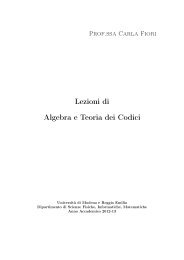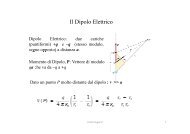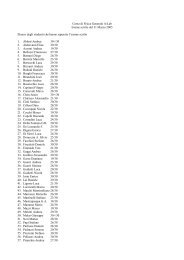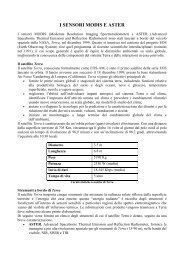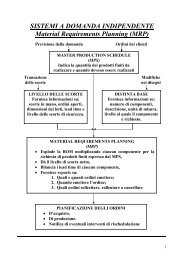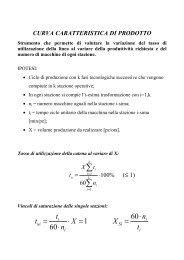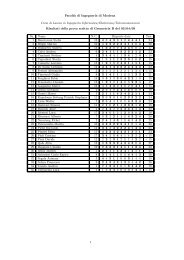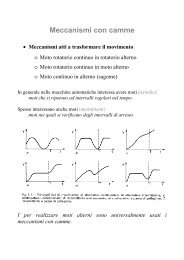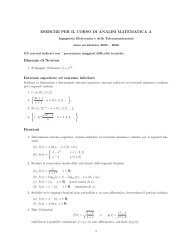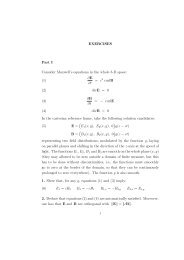- Page 7 and 8: PREFACE This book is devoted to the
- Page 9 and 10: CONTENTS 1. Special families of pol
- Page 11 and 12: Contents ix 7. Derivative Matrices
- Page 13 and 14: 1 SPECIAL FAMILIES OF POLYNOMIALS A
- Page 15 and 16: Special Families of Polynomials 3 n
- Page 17: Special Families of Polynomials 5 B
- Page 21 and 22: Special Families of Polynomials 9 (
- Page 23 and 24: Special Families of Polynomials 11
- Page 25 and 26: Special Families of Polynomials 13
- Page 27 and 28: Special Families of Polynomials 15
- Page 29 and 30: Special Families of Polynomials 17
- Page 31 and 32: Special Families of Polynomials 19
- Page 33 and 34: 2 ORTHOGONALITY Inner products and
- Page 35 and 36: Orthogonality 23 The function w is
- Page 37 and 38: Orthogonality 25 As we promised, we
- Page 39 and 40: Orthogonality 27 Let us now define
- Page 41 and 42: Orthogonality 29 Therefore, one obt
- Page 43 and 44: Orthogonality 31 From (2.3.8), we g
- Page 45 and 46: Orthogonality 33 only mention the r
- Page 47 and 48: 3 NUMERICAL INTEGRATION As we shall
- Page 49 and 50: Numerical Integration 37 In the cas
- Page 51 and 52: Numerical Integration 39 (3.1.9) z
- Page 53 and 54: Numerical Integration 41 We give th
- Page 55 and 56: Numerical Integration 43 where 1
- Page 57 and 58: Numerical Integration 45 (3.2.10)
- Page 59 and 60: Numerical Integration 47 This means
- Page 61 and 62: Numerical Integration 49 (3.4.2) w
- Page 63 and 64: Numerical Integration 51 3.5 Gauss-
- Page 65 and 66: Numerical Integration 53 The proof
- Page 67 and 68: Numerical Integration 55 3.7 Clensh
- Page 69 and 70:
Numerical Integration 57 the first
- Page 71 and 72:
Numerical Integration 59 (3.8.14) p
- Page 73 and 74:
Numerical Integration 61 (3.9.5) p
- Page 75:
Numerical Integration 63 (3.10.5)
- Page 78 and 79:
66 Polynomial Approximation of Diff
- Page 80 and 81:
68 Polynomial Approximation of Diff
- Page 82 and 83:
70 Polynomial Approximation of Diff
- Page 84 and 85:
72 Polynomial Approximation of Diff
- Page 86 and 87:
74 Polynomial Approximation of Diff
- Page 88 and 89:
76 Polynomial Approximation of Diff
- Page 90 and 91:
78 Polynomial Approximation of Diff
- Page 92 and 93:
80 Polynomial Approximation of Diff
- Page 94 and 95:
82 Polynomial Approximation of Diff
- Page 96 and 97:
84 Polynomial Approximation of Diff
- Page 98 and 99:
86 Polynomial Approximation of Diff
- Page 100 and 101:
88 Polynomial Approximation of Diff
- Page 102 and 103:
90 Polynomial Approximation of Diff
- Page 104 and 105:
92 Polynomial Approximation of Diff
- Page 106 and 107:
94 Polynomial Approximation of Diff
- Page 108 and 109:
96 Polynomial Approximation of Diff
- Page 110 and 111:
98 Polynomial Approximation of Diff
- Page 112 and 113:
100 Polynomial Approximation of Dif
- Page 114 and 115:
102 Polynomial Approximation of Dif
- Page 116 and 117:
104 Polynomial Approximation of Dif
- Page 118 and 119:
106 Polynomial Approximation of Dif
- Page 120 and 121:
108 Polynomial Approximation of Dif
- Page 122 and 123:
110 Polynomial Approximation of Dif
- Page 124 and 125:
112 Polynomial Approximation of Dif
- Page 126 and 127:
114 Polynomial Approximation of Dif
- Page 128 and 129:
116 Polynomial Approximation of Dif
- Page 130 and 131:
118 Polynomial Approximation of Dif
- Page 132 and 133:
120 Polynomial Approximation of Dif
- Page 134 and 135:
122 Polynomial Approximation of Dif
- Page 136 and 137:
124 Polynomial Approximation of Dif
- Page 138 and 139:
126 Polynomial Approximation of Dif
- Page 140 and 141:
128 Polynomial Approximation of Dif
- Page 142 and 143:
130 Polynomial Approximation of Dif
- Page 144 and 145:
132 Polynomial Approximation of Dif
- Page 146 and 147:
134 Polynomial Approximation of Dif
- Page 148 and 149:
136 Polynomial Approximation of Dif
- Page 150 and 151:
138 Polynomial Approximation of Dif
- Page 152 and 153:
140 Polynomial Approximation of Dif
- Page 154 and 155:
142 Polynomial Approximation of Dif
- Page 156 and 157:
144 Polynomial Approximation of Dif
- Page 158 and 159:
146 Polynomial Approximation of Dif
- Page 160 and 161:
148 Polynomial Approximation of Dif
- Page 162 and 163:
150 Polynomial Approximation of Dif
- Page 164 and 165:
152 Polynomial Approximation of Dif
- Page 166 and 167:
154 Polynomial Approximation of Dif
- Page 168 and 169:
156 Polynomial Approximation of Dif
- Page 170 and 171:
158 Polynomial Approximation of Dif
- Page 172 and 173:
160 Polynomial Approximation of Dif
- Page 174 and 175:
162 Polynomial Approximation of Dif
- Page 176 and 177:
164 Polynomial Approximation of Dif
- Page 178 and 179:
166 Polynomial Approximation of Dif
- Page 180 and 181:
168 Polynomial Approximation of Dif
- Page 182 and 183:
170 Polynomial Approximation of Dif
- Page 184 and 185:
172 Polynomial Approximation of Dif
- Page 186 and 187:
174 Polynomial Approximation of Dif
- Page 188 and 189:
176 Polynomial Approximation of Dif
- Page 190 and 191:
178 Polynomial Approximation of Dif
- Page 192 and 193:
180 Polynomial Approximation of Dif
- Page 194 and 195:
182 Polynomial Approximation of Dif
- Page 196 and 197:
184 Polynomial Approximation of Dif
- Page 198 and 199:
186 Polynomial Approximation of Dif
- Page 200 and 201:
188 Polynomial Approximation of Dif
- Page 202 and 203:
190 Polynomial Approximation of Dif
- Page 204 and 205:
192 Polynomial Approximation of Dif
- Page 206 and 207:
194 Polynomial Approximation of Dif
- Page 208 and 209:
196 Polynomial Approximation of Dif
- Page 210 and 211:
198 Polynomial Approximation of Dif
- Page 212 and 213:
200 Polynomial Approximation of Dif
- Page 214 and 215:
202 Polynomial Approximation of Dif
- Page 216 and 217:
204 Polynomial Approximation of Dif
- Page 218 and 219:
206 Polynomial Approximation of Dif
- Page 220 and 221:
208 Polynomial Approximation of Dif
- Page 222 and 223:
210 Polynomial Approximation of Dif
- Page 224 and 225:
212 Polynomial Approximation of Dif
- Page 226 and 227:
214 Polynomial Approximation of Dif
- Page 228 and 229:
216 Polynomial Approximation of Dif
- Page 230 and 231:
218 Polynomial Approximation of Dif
- Page 232 and 233:
220 Polynomial Approximation of Dif
- Page 234 and 235:
222 Polynomial Approximation of Dif
- Page 236 and 237:
224 Polynomial Approximation of Dif
- Page 238 and 239:
226 Polynomial Approximation of Dif
- Page 240 and 241:
228 Polynomial Approximation of Dif
- Page 242 and 243:
230 Polynomial Approximation of Dif
- Page 244 and 245:
232 Polynomial Approximation of Dif
- Page 246 and 247:
234 Polynomial Approximation of Dif
- Page 248 and 249:
236 Polynomial Approximation of Dif
- Page 250 and 251:
238 Polynomial Approximation of Dif
- Page 252 and 253:
240 Polynomial Approximation of Dif
- Page 254 and 255:
242 Polynomial Approximation of Dif
- Page 256 and 257:
244 Polynomial Approximation of Dif
- Page 258 and 259:
246 Polynomial Approximation of Dif
- Page 260 and 261:
248 Polynomial Approximation of Dif
- Page 262 and 263:
250 Polynomial Approximation of Dif
- Page 264 and 265:
252 Polynomial Approximation of Dif
- Page 266 and 267:
254 Polynomial Approximation of Dif
- Page 268 and 269:
256 Polynomial Approximation of Dif
- Page 270 and 271:
258 Polynomial Approximation of Dif
- Page 272 and 273:
260 Polynomial Approximation of Dif
- Page 274 and 275:
262 Polynomial Approximation of Dif
- Page 276 and 277:
264 Polynomial Approximation of Dif
- Page 278 and 279:
266 Polynomial Approximation of Dif
- Page 280 and 281:
268 Polynomial Approximation of Dif
- Page 282 and 283:
270 Polynomial Approximation of Dif
- Page 284 and 285:
272 Polynomial Approximation of Dif
- Page 286 and 287:
274 Polynomial Approximation of Dif
- Page 288 and 289:
276 Polynomial Approximation of Dif
- Page 290 and 291:
278 Polynomial Approximation of Dif
- Page 292 and 293:
280 Polynomial Approximation of Dif
- Page 294 and 295:
282 Polynomial Approximation of Dif
- Page 296 and 297:
284 Polynomial Approximation of Dif
- Page 298 and 299:
286 Polynomial Approximation of Dif
- Page 300 and 301:
288 Polynomial Approximation of Dif
- Page 302 and 303:
290 Polynomial Approximation of Dif
- Page 305 and 306:
REFERENCES adams r.(1975), Sobolev
- Page 307 and 308:
References 295 canuto c., hussaini
- Page 309 and 310:
References 297 friedman a.(1959), F
- Page 311 and 312:
References 299 jackson d.(1930), Th
- Page 313 and 314:
References 301 pavoni d.(1988), Sin
- Page 315:
References 303 vainikko g.m.(1964),





